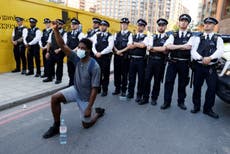Don’t let Matt Hancock fool you, the government is intent on ignoring the root cause of Bame coronavirus deaths
This government’s appalling track record does not inspire much confidence in their ability to represent the interests of ethnic minorities, no matter how many times they say ‘black lives matter’

The Public Health England (PHE) report into how ethnic minority communities have been affected by Covid-19 confirmed much of what was already known about the health disparities faced by ethnic minorities in the UK. Coronavirus has exacerbated existing racial inequalities in Britain.
Some key findings from the report include: ethnic minorities are more likely to be diagnosed with and die from Covid-19; people of Bangladeshi origin were found to be twice as likely to die from Covid-19 than white British people; other ethnic minority groups had between a 10 and 50 per cent higher risk of death when compared to white British people.
In response to the report, Matt Hancock, the health secretary, released a statement stressing that the government would “take action”. He also used the daily Downing Street press conference on Tuesday to state that “black lives matter”, but this is empty rhetoric; no policy plan has been provided indicating what the government will do to reduce the threat posed by Covid-19 to ethnic minorities.
Alarmingly, according to an article by the Health Service Journal (HSJ), the government has also been accused of removing a key aspect of the report which looked at the effects of systemic racism on the lives of ethnic minorities. The article indicates that an early copy of the report included a section which suggested that discrimination plays a part in the increased risk for ethnic minorities. Despite claims that “one source with knowledge of the review said the section ‘did not survive contact with Matt Hancock’s office’ over the weekend”, the government has denied the allegations, with professor Kevin Fenton, regional director at PHE, saying that nothing had been taken out of the document.
Regardless of the government’s position on this matter, the fact remains that inequalities suffered by ethnic minorities in the UK are not new. The Race Disparity Audit, commissioned in 2017 by Theresa May’s government, shed light on some of the inequalities faced by ethnic minorities in the UK. May’s government failed to take clear and decisive action to address the racial disparities highlighted in the audit, just as there are no plans or recommendations in the PHE Report to prevent ethnic minorities from dying at an increased rate from Covid-19.
The inaction by the aforementioned government following the release of the Race Disparity Audit is symptomatic of the value placed on the lives of ethnic minorities. Time and time again the inequalities experienced by ethnic minorities are highlighted, discussed and soon after forgotten; only to be brought back to the forefront when something else happens that affects them, as has been the case with the Covid-19 pandemic.
This government’s track record does not inspire much confidence in their ability to represent the interests of ethnic minorities. The UK’s current immigration policies are reminiscent of their racist and exploitative colonial past. The hostile environment policy, as the name implies, has deliberately made life hard for undocumented migrants, restricting their access to important services such as housing and healthcare. The policy continues to be actively pursued by the government, despite its detrimental impact on the lives of the Windrush generation, some of whom were falsely deemed to be illegal, undocumented migrants. Many of the Windrush generation are still waiting for payment under the Windrush compensation scheme, which was set up to right some of the wrongs of their negative experiences.
A review into the Windrush Scandal was released by the government earlier this year, including the observation from the review’s author, Wendy Williams, that “these failings demonstrate an institutional ignorance and thoughtlessness towards the issue of race and the history of the Windrush generation within the department, which are consistent with some elements of the definition of institutional racism”. As far as I’m concerned, it has done little to take the recommendations in the report on. Who’s to say the same won’t happen in terms of this report into Bame Covid-19 deaths?
The exploitative NHS surcharge requires non-EU migrants to pay £400 – set to rise £624 in October – in addition to their tax and national insurance contributions in order to access public healthcare. On 21 May 2020, NHS workers were made exempt from the surcharge following considerable public pressure, but this plays into the good vs bad immigrant narrative, placing greater emphasis on migrant workers who are deemed to be contributing more to British society.
Then there’s the make-up of the government itself. Boris Johnson’s cabinet may have been lauded for its ethnic diversity and two of the four Great Offices of State may be held by ethnic minority politicians, but in reality, the ethnic diversity of the cabinet is irrelevant and amounts to futile symbolism. As long as the government continues to pursue politics and policies that are repressive to the lives of ethnic minorities, there can be no praise for what essentially amounts to token representation.
Individual acts of prejudice are often the starting point for discussions on race and racism in Britain – we have to go further. British exceptionalism attempts to present systemic racism as an American problem, but whiteness and racism were central to the British Empire and colonialism, as such, racism is embedded in the fabric of British society. The racial inequalities that exist are a symptom of a system that was set up to treat ethnic minorities like second-class citizens. Starting from that point, would do a lot more to eradicate the problems we’re seeing unfold before us.
Empty rhetoric will not suffice. Radical systemic change is required in order to tackle the pervasive racial inequalities that are being exacerbated by Covid-19. I hope we begin to see that soon.
Michael Bankole is a doctoral researcher and host of the podcast Politics JaM. His doctoral research focuses on race, racism, and political representation






Join our commenting forum
Join thought-provoking conversations, follow other Independent readers and see their replies